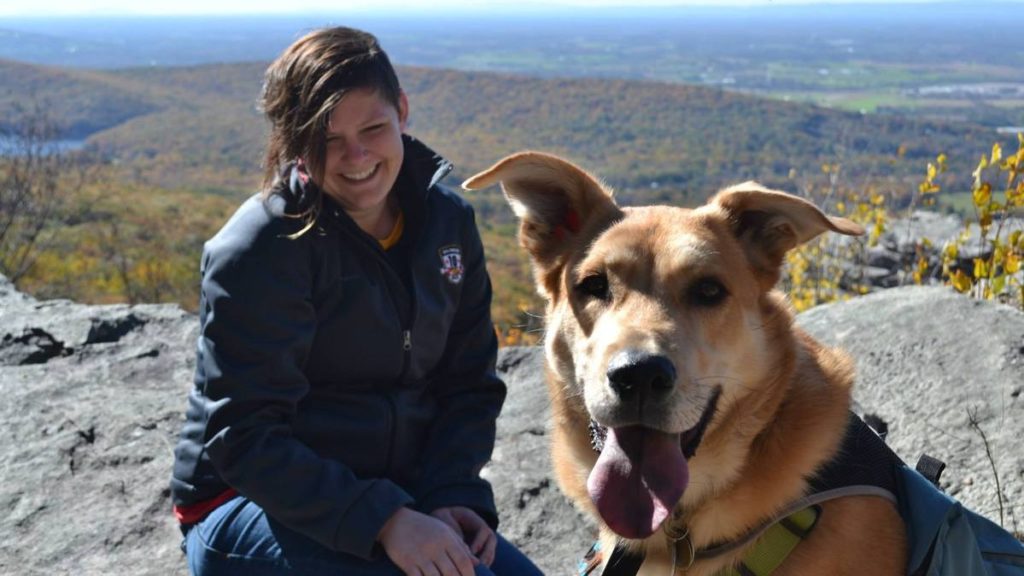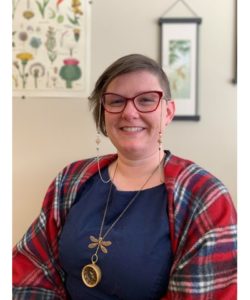
From an early age, Tiffany Banks has always known two things: that she loves animals, and that she wants to be a social worker. As a doctoral student in the Colorado State University School of Social Work, Banks has been able to seamlessly blend her two passions, with the help of Abe, her canine companion.
As Banks progressed with her research, she saw the immense potential animal-assisted intervention has as a therapy option for autistic children. Now, her passion has paid off – Banks presented her research in the CSU’s Vice President for Research Office Three-Minute Challenge competition and was selected as one of the 2022-2023 VPR Fellows.
Banks’ journey to Colorado
Banks began her academic journey at Niagara University, in Lewiston, New York, where she got her undergraduate degree in social work. She then returned to Baltimore, Maryland, where she grew up, to obtain her master’s degree from the University of Maryland in 2009.
When Banks chose to attend CSU to pursue her Ph.D. in social work, a deciding factor for her was CSU’s accessibility for neurodiverse individuals such as herself. CSU doesn’t require the GRE, a standardized test designed to measure overall academic readiness for graduate school, though many feel it’s outdated and un-inclusive of several populations.
“While seemingly small, the fact that CSU didn’t require this standardized assessment made me feel like the culture at CSU was going to be a good match for me,” said Banks.

The lightbulb moment
Banks was working as a social worker at Rifle Middle School in Rifle, Colorado, when she thought to ask her administrator if she could incorporate Abe into her work with the students there. Her lightbulb moment was when she realized how special Abe’s presence in the classroom was. After that, she spent a year training and working towards getting Abe certified as a therapy dog.
“We would visit one classroom to provide social skills group work and during one of these sessions a student left the group when they were experiencing strong emotions,” said Banks. “Without prompting, Abe followed that student and laid with him while he stroked his fur… His presence was motivating and calming to the students and they looked forward to his visits.”
Banks and Abe relocated to Denver to work at the Children’s Hospital, where Banks landed an opportunity that would propel her onto the trajectory she’s currently following. At the Children’s Hospital, she worked alongside Dr. Robin Gabriels, who had recently won a grant to study the impact of animal-assisted activities on autistic youth who had been placed in psychiatric mental institutions. Banks asked if she could assist Gabriels with her research.
“I can’t thank her enough for saying yes,” Banks said. “That study was the first research opportunity I had that made me feel like I could be a unique part of the research team; I had something to contribute.”
The three-minute presentation
Banks’ speech for the VPR Three-Minute Challenge, available for viewing here on YouTube, details the incredible potential of animal-assisted interventions among children with autism and touches on Banks and Abe’s first-hand experiences so far with this alternative form of therapy.
“Research has suggested that dogs have been shown to increase eye contact and interactions between therapists and those with autism,” Banks said, during her presentation. “Other animals like guinea pigs have increased children with autism’s excitement to attend school and can help them interact with other children in their classrooms. Meanwhile, therapeutic horseback riding has been shown to improve mood regulation and language development among children with autism.”
Banks also compared animal-assisted interventions with the most common treatment for autistic people: applied behavioral analysis. In her presentation, Banks explained that the objective of ABA is not necessarily to improve the quality of life for those with autism, but to change their behavior to better match what the world expects from them. It’s important to note that Banks is not condemning ABA out of hand, but rather highlighting the controversy that surrounds it, especially stressing the importance of elevating autistic voices when studying the impact of different treatments for autistic people.
“ABA isn’t harmful because I said so, I am listening to what people with autism are saying about their experiences and using my academic platform to elevate their voices,” said Banks.
When condensing such a complex, highly important topic into such a bite-sized presentation, the most critical step is to decide what pieces of information are to be included, and which must be left out.
“I must have written three or four different presentations before settling on the narrative I went with for the presentation,” said Banks.
Ultimately, though, once Banks began to think and write in her own voice, without trying to be overly academic, the presentation just came together.

On being named a VPR Fellow
Many people who win prestigious awards report feelings of anxiety and fear that they’re not worthy of the recognition they’ve been awarded. And although being named a VPR Fellow is an opportunity that opens doors, Banks was not immune to these conflicting feelings.
“Part of me feels overwhelmed and nervous,” said Banks. “That’s the part of me that still feels plagued by imposter syndrome and worries that I should have all the answers. No one has all the answers. Then I feel excited and honored. I am excited to represent social work science in an interdisciplinary platform and I feel honored that my department and the selection committee saw potential in me to take on that challenge.”
And if anyone is up for the challenge, it’s the power team of Banks and Abe. Banks currently runs a nonprofit called Rocky Mountain Sibs, aimed at empowering the siblings of those with disabilities to advocate for themselves and their families, and she is planning to forge a career in higher education.
“I hope to leverage a career in academia to create safer spaces on campus for students with disabilities so that we can diversify the social work workforce,” said Banks. “I am passionate about my research, but I am also very committed to educating future social workers.”
Read more about all the VPR Fellows here.
The School of Social Work is part of CSU’s College of Health and Human Sciences.